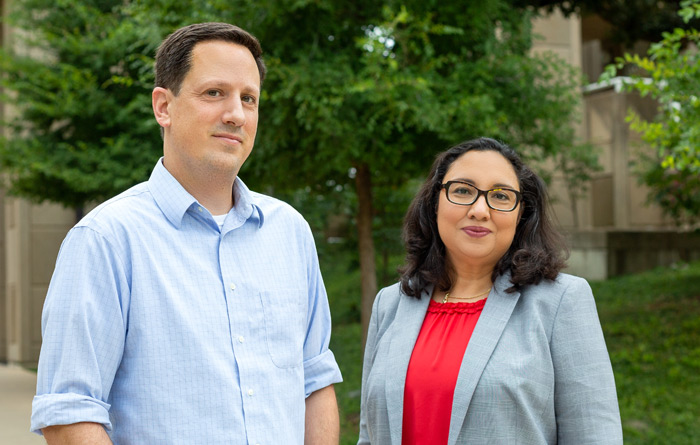Dr. Noah Sasson and Dr. Amandeep Sra have been honored as two of The University of Texas System’s best educators.
The University of Texas at Dallas faculty members received the 2019 Regents’ Outstanding Teaching Award. They are among 27 honorees from the state’s 14 academic and health institutions who will be recognized Aug. 14 at the Board of Regents’ meeting in Austin. Each will receive $25,000, a medallion and a certificate for their achievements.
Sasson, an associate professor in the School of Behavioral and Brain Sciences (BBS), was the 2017 recipient of BBS’ Aage Møller Teaching Award. Sra, a chemistry senior lecturer in the School of Natural Sciences and Mathematics (NSM), received the 2018 Centennial Award for Excellence in Undergraduate Teaching from Iota Sigma Pi, the national honor society for women in chemistry.

Dr. Noah Sasson and Dr. Amandeep Sra
“As their prior awards have indicated, Dr. Sra and Dr. Sasson exemplify the commitment to teaching, and more broadly to our students, that is at the core of our University,” said Dr. Inga Musselman, provost, vice president for academic affairs and holder of the Cecil H. Green Distinguished Chair of Academic Leadership. “They and faculty members like them change lives for the better every day in the classroom and beyond. We are proud to have wonderful teachers like Dr. Sasson and Dr. Sra represent us to the world.”
The Board of Regents established the award in 2008 to recognize exemplary service to students. Including the 2019 honorees, 35 UT Dallas faculty members have received the award.
Sasson, who arrived at UT Dallas in 2009, researches mechanisms that contribute to social difficulties for individuals with autism spectrum disorder (ASD), focusing on the ways in which people perceive and process social information. He hopes his work helps to improve the social experiences of those with ASD, increase social acceptance of their differences and ultimately lead to better life outcomes.
To help students make the most of their abilities, Sasson said he encourages them to think about how psychology can play a clarifying role in understanding the human dynamics underlying many contemporary issues.
“Students tend to respond better, and ultimately learn better, when course content isn’t presented in some stuffy or abstract way that makes it feel 10 steps removed from their daily lives,” Sasson said. “Instead, I try to get them to see that psychology really can be ground zero for gaining insight into themselves, into others, and into the complicated and often overwhelming world that we all share.”
“Dr. Sra and Dr. Sasson exemplify the commitment to teaching, and more broadly to our students, that is at the core of our University. They and faculty members like them change lives for the better every day in the classroom and beyond.”
Dr. Inga Musselman, provost and vice president for academic affairs at UT Dallas
Sasson explained that getting this point across “requires connecting with students, engaging with them, and showing them — not just telling them — how course content is meaningful to them, particularly by helping them learn to better evaluate evidence and draw more accurate conclusions.”
He said that working with UT Dallas undergraduates in the classroom and laboratory “has helped me recognize at a much more personal level how incredibly talented, hardworking and curious UTD students are.”
Sra, who in the last two years has received both a President’s Teaching Excellence Award in Undergraduate Instruction from UT Dallas and an Outstanding Teacher Award from NSM, began teaching at UT Dallas in 2011, and instructs freshman and sophomore general chemistry courses and laboratories. She previously worked for the University as a research associate in materials science and in electrical engineering.
Sra described listening to students’ individual preferences as essential to tailoring a student-centered, empowering learning process.
“Understanding how students learn is a very significant aspect of teaching, and listening precedes understanding,” she said. “I always heard students; now I make that conscious effort to listen. In doing so, a channel of communication opens up, allowing us both to develop a plan and facilitating a successful learning experience.”
Working to make these connections gives students a sense of belonging, confidence and motivation to succeed, Sra said.
“The driving force for all my endeavors has been to connect with my students in a way that is much more than just being a good teacher,” she said. “Most significantly, I value serving as an advocate whom students feel comfortable approaching both after class and for many years after graduation.”